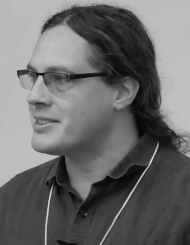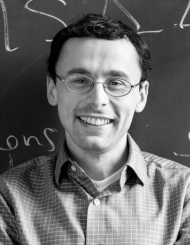
Virtual Event: David Wallace
presenting
Philosophy of Physics:
A Very Short Introduction
in conversation with JACOB BARANDES
DateOct
12
Tuesday
October 12, 2021 5:00 PM ET |
LocationJoin our online event (or pre-register) via the link in the event description.
|
Tickets
Free - $5 contribution suggested at registration
|
Harvard Book Store, the Harvard University Division of Science, and the Harvard Library welcome DAVID WALLACE—The Mellon Chair in Philosophy of Science at the University of Pittsburgh—for a discussion of his latest book, Philosophy of Physics: A Very Short Introduction. He will be joined in conversation by JACOB BARANDES, Co-Director of Graduate Studies for Physics at Harvard University.
Contribute to Support Harvard Book Store
While payment is not required, we are suggesting a $5 contribution to support this author series, our staff, and the future of Harvard Book Store—a locally owned, independently run Cambridge institution. In addition, by purchasing a copy of Philosophy of Physics on harvard.com, you support indie bookselling and the writing community during this difficult time.
About Philosophy of Physics
Philosophy of physics is concerned with the deepest theories of modern physics—notably quantum theory, our theories of space, time and symmetry, and thermal physics—and their strange, even bizarre conceptual implications. A deeper understanding of these theories helps both physics, through pointing the way to new theories and new applications, and philosophy, through seeing how our worldview has to change in the light of what we learn from physics.
This Very Short Introduction explores the core topics in philosophy of physics through three key themes. The first—the nature of space, time, and motion—begins by considering the philosophical puzzles that led Isaac Newton to propose the existence of absolute space, and then discusses how those puzzles change—but do not disappear—in the context of the revolutions in our understanding of space and time that came first from special, and then from general, relativity. The second—the emergence of irreversible behavior in statistical mechanics—considers how the microscopic laws of physics, which know of no distinction between past and future, can be compatible with the melting of ice, the cooling of coffee, the passing of youth, and all the other ways in which the large-scale world distinguishes past from future. The last section discusses quantum theory—the foundation of most of modern physics, yet mysterious to this day. It explains just why quantum theory is so difficult to make sense of, how we might nonetheless attempt to do it, and why the question has been highly relevant to the development of physics, and continues to be so.
The Harvard Science Book Talks series is a collaboration between the Harvard University Division of Science, the Harvard Library, and Harvard Book Store. The series features talks by the authors of recently published books on a variety of science-related topics and is open to both the Harvard community and to the general public. Typically, lectures are followed by a book signing with the author and refreshments. Learn more and watch recordings of past talks here.
(617) 661-1515
info@harvard.com
Media Inquiries
mediainquiries@harvard.com
Accessibility Inquiries
access@harvard.com
Classic Totes
Tote bags and pouches
in a variety of styles,
sizes, and designs, plus mugs, bookmarks, and more!
Shipping & Pickup
We ship anywhere in the U.S. and orders of $75+ ship free via media mail!
Learn More »Noteworthy Signed Books: Join the Club!
Join our Signed First Edition Club (or give a gift subscription) for a signed book of great literary merit, delivered to you monthly.
Learn More »










